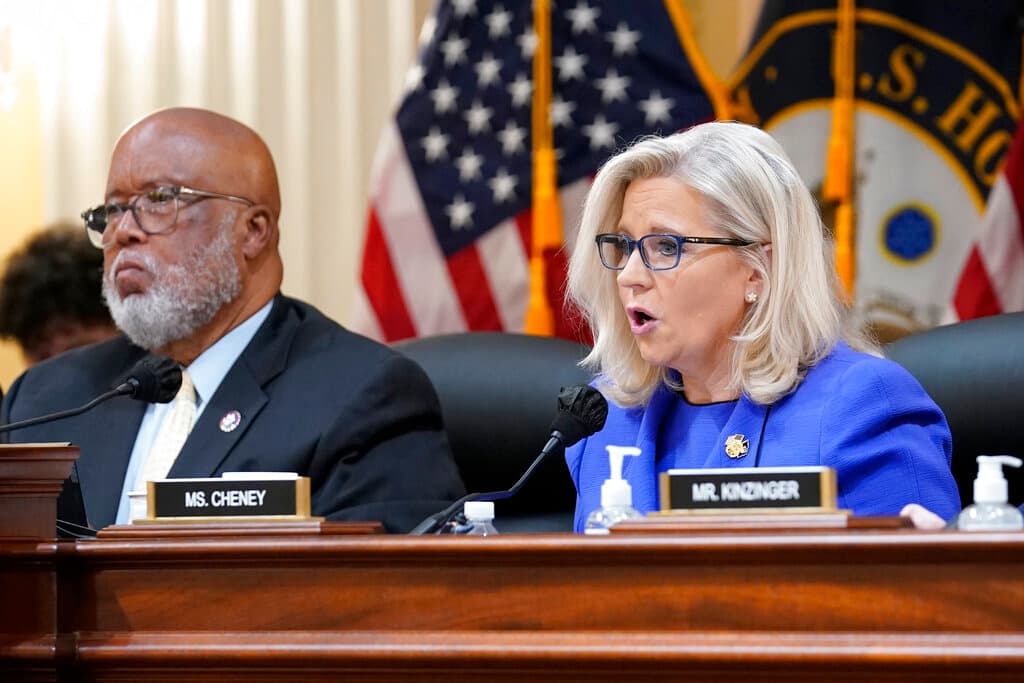January 6 Committee Closes Up Shop, Recommending Prosecution of Trump
Panel’s leaders say ‘our system of Justice is responsible for what comes next.’

WASHINGTON — The House January 6 committee is shutting down, having completed a whirlwind 18-month investigation of the 2021 Capitol riot and sent its work to the Justice Department along with a recommendation for prosecuting former President Donald Trump.
The committee’s time officially ends Tuesday when the new Republican-led House is sworn in. With many of the committee’s staff already departed, remaining aides have spent the last two weeks releasing many of the panel’s materials, including its 814-page final report, about 200 transcripts of witness interviews, and documents used to support its conclusions.
Lawmakers have said they want to make their work public to underscore the seriousness of the attack and Mr. Trump’s multi-pronged effort to try to overturn the election.
“Accountability is now critical to thwart any other future scheme to overturn an election,” Chairman Bennie Thompson, a Mississippi Democrat, and Vice Chairwoman Elizabeth “Liz” Cheney, a Wyoming Republican, wrote in a departing message on Monday. “We have made a series of criminal referrals, and our system of Justice is responsible for what comes next.”
Some of the committee’s work — such as videotape of hundreds of witness interviews — will not be made public immediately. The committee is sending those videos and some other committee records to the National Archives, which by law would make them available in 50 years. Members of the committee said they didn’t release that videotape now because it would have been too difficult to edit it and redact sensitive information.
Incoming Republican leaders may try to get those materials much sooner, though. A provision in a package of proposed House rules released Sunday calls for the National Archives to transfer “any records related to the committee” back to the House no later than January 17.
It is unclear whether the GOP-led House could enforce the provision and what they would do with the materials.
The committee’s conclusion comes after one of the most aggressive and wide-ranging congressional investigations in recent memory. The panel formally or informally interviewed more than 1,000 witnesses, collected more than 1 million documents and held 10 well-watched hearings.
The two Republicans and seven Democrats on the panel were able to conduct the investigation with little interference after the House Republican leader, Congressman Kevin McCarthy, declined to appoint minority members, angry that Speaker Pelosi had rejected two of his suggested appointments.
In the end, the panel came to a unanimous conclusion that Mr. Trump coordinated a “conspiracy” on multiple levels, pressuring states, federal officials and lawmakers to try to overturn his defeat, and inspired a violent mob of supporters to attack the Capitol and interrupt the certification of President Biden’s win.
The panel recommended that the Justice Department prosecute Mr. Trump on four crimes, including aiding what it termed an insurrection.
While a so-called criminal referral has no real legal standing, it is a forceful statement by the committee and adds to political pressure already on Attorney General Garland and the special counsel John “Jack” Smith, who is conducting an investigation into January 6 and Mr. Trump’s actions.
“This is the most intense investigation I’ve been involved in,” said Congresswoman Zoe Lofgren of California, who has been in the House for almost three decades.
She served as an aide to a member on the House Judiciary Committee in the 1970s when Congress was preparing to impeach President Nixon. Ms. Lofgren was also in the House for President Clinton’s impeachment and served as an impeachment manager during Mr. Trump’s first impeachment three years ago.
“I have never been involved in anything as wide ranging and intense,” Ms. Lofgren said. She says that at the beginning of the probe, she felt it would be a success if there was a renewed enthusiasm for protecting democracy.
In the November midterm elections, 44 percent of voters said the future of democracy was their primary consideration at the polls, according to AP VoteCast, a national survey of the electorate.
Ms. Lofgren says she believes the committee made clear that Mr. Trump was responsible for the rioting and “it was not done at the last minute.” “I think we proved that and we sent it all to the Department of Justice,” Ms. Lofgren said. “We’ll see what they do.”
Associated Press
